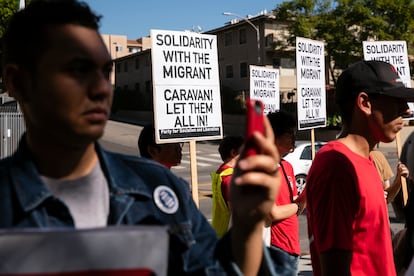California, the frontline of resistance against Trump
The Democratic state is preparing to lead the legal battle against the president-elect’s policies on immigration, reproductive rights, and the environment


Two days after Donald Trump won the presidential election, California Governor Gavin Newsom requested $25 million from the state legislature to fund potential lawsuits against the new administration, which takes office on January 20. This is just the beginning. California is preparing to once again become a stronghold of liberal resistance against Trump’s policies on issues such as immigration, reproductive rights, social assistance, and environmental protection. Both Newsom and California played this role during Trump’s first presidency, but neither the governor, the re-elected president, nor the political climate in California are the same as they were four years ago.
While Trump lost California in the election (38.3% to Kamala Harris’s 58.5%), he won in 31 of the state’s 58 counties, including some with large Latino populations such as San Bernardino, Riverside, and Fresno, which had voted Democrat in 2020. On the electoral map, the eastern part of the state, which is predominantly rural, is tinted red. The farming sector in these areas, which employs a significant portion of the state’s undocumented workforce, largely supported Trump — despite the president-elect’s promise to deport many of these workers.
Newsom is also at a high point in his political career. With two years left in office, he has sought to build what he calls a “California against Trump” and is positioning himself as a potential Democratic contender for the 2028 presidential race. “The freedoms we hold dear in California are under attack — and we won’t sit idle,” Newsom said in a statement calling for a special legislative session to increase funding for the Department of Justice to litigate and defend against policies that run counter to state laws.
California Attorney General Rob Bonta is already preparing to challenge measures on issues such as abortion restrictions, protections for Dreamers under DACA, and the civil rights of transgender youth. “We’ve been through this before, and we stand ready to defend your rights and protect California values,” Bonta said.
During Trump’s first term, California filed or joined over a hundred lawsuits that successfully halted several of his immigration and health policies. These efforts included defending “sanctuary laws” which limit local cooperation with federal immigration authorities; maintaining temporary protected status (TPS) for certain immigrants; and protecting the DACA program, which shields Dreamers from deportation. The state also fought to preserve the Affordable Care Act (Obamacare), which provides affordable health insurance for millions of Americans.
According to a memo leaked to Politico, Newsom plans to create a network of support for undocumented immigrants and their families, offering legal and economic assistance in collaboration with civil and community organizations.
California has the largest immigrant population in the country, accounting for 23% of the national total, according to figures from the Pew Research Center. While most immigrants in the state (82%) are naturalized or have legal residency, 18% are undocumented and face the threat of deportation under Trump’s proposed mass deportation plan.
An editorial in the Los Angeles Times on December 24 warned of the devastating impact mass deportations would have on California. “The people who could be swept up by mass deportation plans include teachers and coaches, child-care providers and home health and long-term care workers,” the editorial noted. “California’s farms, which provide more than one-third of the nation’s vegetables and three-quarters of its fruits and nuts, are sustained largely by immigrant labor — at least half of the state’s farmworkers are undocumented — as are many other parts of the state’s economy such as construction and service work”
While New York — a city that has received more than 225,000 migrants since the spring of 2022 — was once expected to be another battleground against Trump’s policies, recent statements from New York City Mayor Eric Adams suggest that California may stand alone in this resistance. Adams has expressed willingness to collaborate with Trump on plans to deport undocumented immigrants who have committed violent crimes.
“We’re not going to be a safe haven for those who commit repeated violent crimes against innocent migrants, immigrants and longstanding New Yorkers,” he said, following a meeting with Tom Homan, appointed by Trump as the future “border czar.” Trump, eager to court Adams, has even suggested he would consider a presidential pardon for the mayor, who was formally charged with bribery in September.
At the opposite end of the spectrum, Texas Governor Greg Abbott is positioning himself as one of Trump’s most ardent allies in executing mass deportations and completing the border wall. Abbott has vowed to do “whatever it takes” to curb undocumented immigration. So far, the governor has deployed the National Guard along the Texas-Mexico border and erected barriers to block crossings along the Rio Grande. Abbott also announced that he would put up billboards in Mexico and Central America with messages discouraging migrants from crossing into the U.S. without proper documentation.
Sign up for our weekly newsletter to get more English-language news coverage from EL PAÍS USA Edition
Tu suscripción se está usando en otro dispositivo
¿Quieres añadir otro usuario a tu suscripción?
Si continúas leyendo en este dispositivo, no se podrá leer en el otro.
FlechaTu suscripción se está usando en otro dispositivo y solo puedes acceder a EL PAÍS desde un dispositivo a la vez.
Si quieres compartir tu cuenta, cambia tu suscripción a la modalidad Premium, así podrás añadir otro usuario. Cada uno accederá con su propia cuenta de email, lo que os permitirá personalizar vuestra experiencia en EL PAÍS.
¿Tienes una suscripción de empresa? Accede aquí para contratar más cuentas.
En el caso de no saber quién está usando tu cuenta, te recomendamos cambiar tu contraseña aquí.
Si decides continuar compartiendo tu cuenta, este mensaje se mostrará en tu dispositivo y en el de la otra persona que está usando tu cuenta de forma indefinida, afectando a tu experiencia de lectura. Puedes consultar aquí los términos y condiciones de la suscripción digital.








































